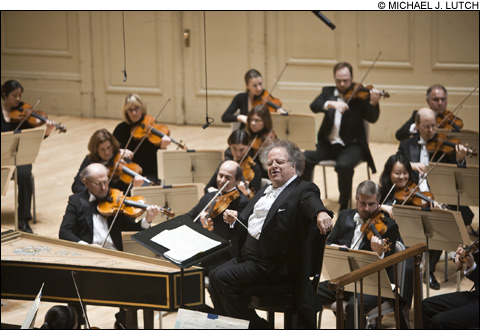
INFORMATION, PLEASE How many of Levine’s critics have actually heard him conduct? |
The local news assault on BSO music director James Levine — who is still recuperating from back surgery and has had to cancel his appearances at Tanglewood this summer — makes my blood boil. The most recent, on July 18, was a lead editorial in the Boston Globe ("For BSO, conductor's absence creates awkward dynamics") calling for his resignation if he does not recover "in a reasonable time." Back in May, Sam Allis wrote an article in the Globe's "G" section asking Levine "to bow out for the good of the orchestra." (Allis also suggested that David Ortiz might need some time in Pawtucket — he was wrong on that score, too.) An unsympathetic Emily Rooney devoted segments of her radio and TV shows, on the same day, to the issue.
Certainly, Levine's physical problems — which have included an emergency kidney operation and a torn rotator cuff when he tripped on stage — have been unfortunate. But instead of offering sympathy, the media have gone after him. (Did they attack Seiji Ozawa when he missed weeks of BSO performances after a skiing accident? Or Charles Munch for all the performances he missed?) They've made the disingenuous, kneejerk acknowledgment "Of course he's a good conductor" without a true understanding of how good Levine really is, or what music directors actually do, or how few musicians in the world are on his level (and how far into the future these few are committed to their present positions).
Two largely unproven young conductors have recently made headlines for being hired by symphony orchestras in LA and Philadelphia. The Globe editorial (surely not written by any of the paper's classical music critics) wondered whether Boston shouldn't take the same route. Back in 1973, the BSO did just that when it hired Seiji Ozawa, and the result was neither good for the orchestra nor for Ozawa, who became a celebrity before he could develop as an artist. When Levine arrived, after 29 years of beads and turtlenecks and dancing on the podium (he himself has been criticized for conducting from a chair, as if that made any musical difference), he had to repair the damage. Don't we owe him big time for restoring the BSO to a leading place among international orchestras?
Both Emily Rooney and the Globe editorial have criticized Levine for not living in Boston. ("It would be far easier for Bostonians to rise to his defense if he lived here," wrote the Globe.) How many BSO music directors have taken up residence here? How many major music directors live full time in the city of their orchestras? Ozawa had houses in Newton and the Berkshires, but his family lived in Japan. Levine has been a more active member of the Boston community than any BSO conductor since Koussevitzky, making numerous public appearances, attending concerts, being a regular customer at local stores, markets, book fairs, and restaurants. So maybe he doesn't share Ozawa's passion for the Red Sox. Did Leinsdorf, or Munch, or Monteux? (At his first press conference, when asked whether he'd be rooting for the Sox or the Yankees, he pointed out that he'd grown up in Cincinnati: "I'm a National League man.")